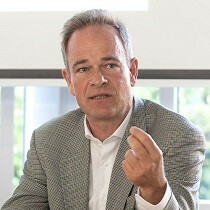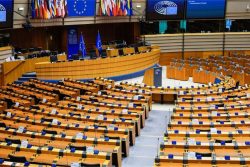Date: 14/03/2023
Wolfram Kaiser is Professor of European Studies at the University of Portsmouth. Since April 2022, he has been heading the newly established European Parliament (EP) History Service in Brussels in a part-time role. He has widely researched and published on European and international history, European integration, and the European Union. Some of his most recent publications deal with political groups in the EP and the EP’s role in fostering the EU’s democratic reform.

Contact details:
Wolfram Kaiser , Wolfram.Kaiser@port.ac.uk
Following the end of the Cold War, Francis Fukuyama (1992) proclaimed the “end of history.” In the struggle between the West and the Soviet Union, he argued, the democratic states had prevailed. More and more countries across the world, he predicted, would adopt some form of parliamentary democracy with elements of a market economy. As he clarified later, Fukuyama (2007) had the newly transformed European Union (EU) in mind as an example of organised transnational democracy that had the power to shape the future of peaceful and cooperative global politics.
Normative power European Union?
The end of the Cold War and the transformation of the European Communities into the EU in the 1992 Maastricht Treaty instilled hope in many scholars of European integration that the organisation would become a beacon of freedom and a force for good in rule-bound institutionalised global politics. Contrary to the then still marginal Faragist (related to the UK’s Nigel Farage ideology) narrative of the EU as an oppressive bureaucratic Empire strangling nation-states – purported to be the only effective source of democratic legitimacy and sovereignty – constructivist-minded scholars like Ian Manners (2002) explored the role of the EU as a “normative power.” Drawing on the example of the progressive outlawing of capital punishment by more and more member-states of the United Nations, he sought to demonstrate that the EU and its member-states were effectively shaping global values in line with their own historical experience of transnational cooperation and with their normative preferences. These norms were first defined in the 1950 European Convention on Human Rights and have since become enshrined in a broadly similar form in the Charter of Fundamental Rights from 2000 that has become incorporated into EU primary law through the 2009 Lisbon Treaty.
Since Manners first came up with the notion of the EU as a “normative power,” global politics has become far less conducive to the spread of EU norms. Meanwhile, China and Russia have become predatory powers with imperial ambitions. They have no interest in international organisations or the protection of liberal legal norms. Fiercer economic competition over resources like minerals has also induced the EU to shed much of its incipient human rights conditionality in its relations with states in Africa and elsewhere. Since Russia’s attack on Ukraine on 24 February 2022, at the very latest, the world is experiencing not the end of history, but its return, and more generally, the return of great power competition more reminiscent of the time before the First World War than the Cold War.
Normative Power European Parliament?
While the European Commission has proclaimed a new phase of strategic competition with other powers like China, requiring a more realist approach to defining European interests rather than values, the European Parliament (EP) has invested considerable time and resources into maintaining the organisation’s human rights agenda in its external relations. Though the EP has limited formal powers in the EU’s external relations, since the Lisbon Treaty, trade, association, and accession treaties require its consent. This legal power gives the EP tacit influence over questions of human rights and environmental norms in trade treaties, for example. The same legal power would also allow the EP to block EU accession of an authoritarian state like Turkey, were the EU to continue the accession negotiations in earnest.
In the absence of greater powers, however, the EP has a strong track-record of debating human rights and democratic conditionality issues in the Political Affairs Committee and more recently, in a sub-committee of its Foreign Affairs Committee devoted to human rights issues, as well as in the plenary. In fact, in the absence of relevant treaty provisions, the EP’s 1961 Birkelbach Report already stipulated conditions for membership, in what was then the European Economic Community, anticipating a possible application by Franco’s Spain, which later became incorporated into the so-called Copenhagen Criteria and now the Lisbon Treaty. The EP has often used its own initiative reports, visits by its delegations to third countries, and resolutions to propagate and demand respect for human rights. It has also developed a repertoire of symbolic politics including the Sakharov Prize for Freedom of Thought, first awarded to the South African anti-apartheid activist Nelson Mandela and the Soviet dissident Anatoly Marchenko in 1988.
The EP and Russia’s war on Ukraine
The Russian attack on Ukraine and its brutal war of indiscriminate aerial attacks and targeting of civilians and prisoners of war have energised the EP to play a leading and publicly very visible role in condemning Russian policy and behaviour. It has also urged the EU and its member-states to wean themselves off their energy dependency on Russian oil and gas and to support the Ukraine militarily as well as with humanitarian aid. Under the leadership of its Maltese President since January 2022, Roberta Metsola, who has often acted in tandem with other female leaders, like the German Commission President Ursula von der Leyen, the EP successfully pushed for policies like the 90 days visa free travel for Ukrainian refugees, in a stark contrast with the restrictive UK approach. The EP also demanded greater financial support for member-states, who accepted high numbers of refugees like Poland; and using EU, not just member-state funds, for humanitarian and military aid. Moreover, the EP played a leading role in advance lobbying to award the Ukraine EU candidate status in June 2022, a highly symbolic act in the light of the ongoing war and the country’s lack of preparedness for the legal and economic conditions of membership.
The EP also elaborated its repertoire of symbolic politics to support Ukraine. On 1 March 2022, only five days after the Russian attack, it held an extraordinary plenary session in Brussels to debate the Russian aggression. It established a global pattern by inviting Ukrainian President Volodymyr Zelensky to address it via video link; crucially, before the US Congress, the UK Parliament or EU member-state parliaments. Moreover, on 1 April 2022, Metsola was the first leader of an EU institution to visit Kyiv since the start of Russia’s war. She addressed the Rada, the Ukrainian Parliament, insisting that “you are fighting for what we all believe in: freedom, democracy, the rule of law. Without these values, there is nothing else.” With these and other interventions, Metsola, individual MEPs, and the EP collectively, and through its Ukraine resolutions, have played a significant role in shaping the EU’s overall narrative on Russian aggression and supporting Zelensky’s strategy to maximize international support for his country.
Most recently, in January 2023, the EP demanded the creation of a special tribunal to facilitate the persecution of Russian war crimes. While the International Criminal Court in the Hague is responsible in principle for the persecution of such crimes, Russia is not a member, which could complicate its work. The EP has pushed for greater military support for Ukraine, too. In the same month, at the initiative of the former German Green Party co-leader and current MEP, Reinhard Bütikofer, the EP demanded that Germany, as part of a larger consortium of EU member-states including Poland and Finland, who had already signalled their support, organise the transfer of the more advanced Leopard II battle tanks to Ukraine.
The EP’s strong support for Ukraine has not always yielded immediate results in policy terms; the special tribunal, which would require international support beyond the EU, may never be created. The German government did not immediately decide to send Leopard II battle tanks at the Ramstein meeting to coordinate military support for the Ukraine. However, EP pressure at least added to moral pressure that eventually induced the German government to announce the delivery of 14 such tanks a few days later, on 25 January 2023. Moreover, the EP’s recent corruption case of Eva Kaili, the Greek Socialist MEP, who collaborated with a dubious Italian-run NGO and allegedly took money from Qatar to influence and moderate (albeit without success) the EP’s criticism of the World Cup host’s human rights track-record, has dented the institution’s own credibility.
Nevertheless, the EP has consistently made a strong and meaningful contribution to supporting Ukraine in its defence against Russian aggression and legitimising EU humanitarian and military aid; something that may yet prove decisive should Western public opinion loose interest or shrink away from bolder support in the face of Russian threats. In this sense, the
EP has, with some success at least, exercised “normative power.”
Fukuyama, Francis (2007). The History at the End of History, The Guardian, 18 June.
Fukuyama, Francis (1992). The End of History and the Last Man. New York: Free Press.
Manners, Ian (2002). Normative Power Europe: A Contradiction in Terms? Journal of Common Market Studies, 40(2), pp. 235-58.
